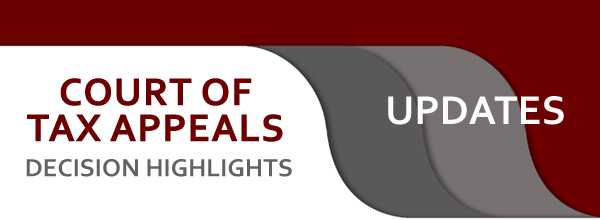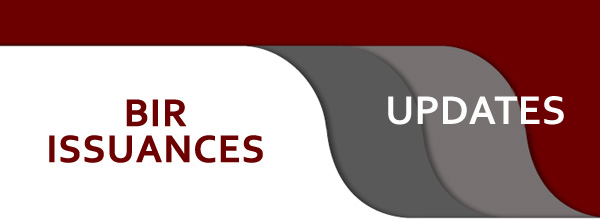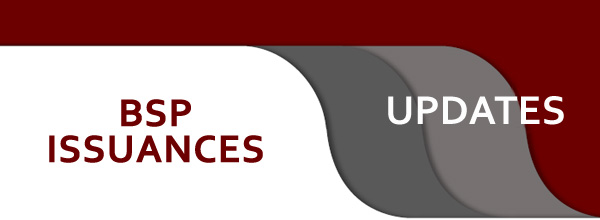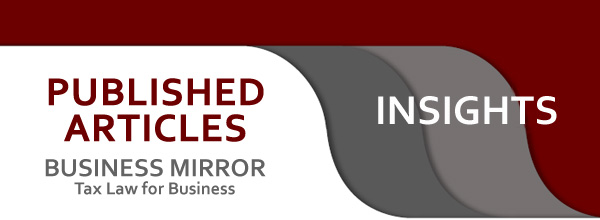

JANUARY • VOL. 1 • SERIES OF 2023
INSIGHTS is a monthly publication of BDB LAW to inform, update and provide perspectives to our clients and readers on significant tax-related court decisions and regulatory issuances (includes BIR, SEC, BSP, and various government agencies).

DISCLAIMER: The contents of this Insights are summaries of selected issuances from various government agencies, Court decisions, and articles written by our experts. They are intended for guidance only and as such should not be regarded as a substitute for professional advice.
Copyright © 2023 by Du-Baladad and Associates (BDB Law). All rights reserved. No part of this issue covered by this copyright may be produced and/or used in any form or by any means – graphic, electronic, and mechanical without the written permission of the publisher.
What's Inside ...
- HIGHLIGHTS FOR DECEMBER 2022
- SIGNIFICANT COURT DECISIONS
- Supreme Court
- Court of Tax Appeals
- SIGNIFICANT REGULATORY ISSUANCES
- Bureau of Internal Revenue
- Bangko Sentral Ng Pilipinas
- Insurance Commission
- Fiscal Incentives Review Board
- PUBLISHED ARTICLE
- Tax Highlights in 2022
- OUR EXPERTS
- The Personalities
- The Personalities


HIGHLIGHTS for DECEMBER 2022
COURT DECISIONS
- The 15-day period provided under Revenue Regulations No. 12-99 for a taxpayer to reply to a PAN should be strictly observed by the BIR. (Prime Steel Mill, Inc. vs. CIR, G.R. No. 249153, September 12, 2022)
- The phrase “when the relevant sales were made” refers to zero-rated sales, and not to the purchase of goods and services from which it is incurred input VAT. (Maibarara Geothermal Inc. vs. Commissioner of Internal Revenue, G.R. No. 250479, July 18, 2022)
- The submission of SAWTs and MAPs is not required to prove entitlement to the refund of excess unutilized CWT. (Commissioner of Internal Revenue v. Sonoma Services, Inc., CTA EB No. 2416 (CTA Case No. 9771), December 7, 2022)
- The 180-day period in case of an administrative appeal is “counted from the date of filing of the protest”. (Larry E. Segaya /LES Engineering and Construction v. Commissioner of the Bureau of Internal Revenue, CTA EB No. 2526 (CTA Case No. 9875), December 13, 2022)
BIR ISSUANCES
- RMC No. 152-2022, December 7, 2022 – This clarifies the transitory provisions for the VAT zero-rate incentives under Sections 294(E) and 295(D), Title XIII of the Tax Code, as amended, and as implemented by Section 5, Rule 2 and Section 5, Rule 18 of the CREATE Act Implementing Rules And Regulations (CREATE IRR).
- RMC No. 153-2022, December 7, 2022 – This announces the availability of the BIR Online Registration and Update System (ORUS).
- RMO No. 55-2022, December 15, 2022 – This suspends all audit and other field operations of the BIR effective December 16, 2022.
BSP ISSUANCES
- BSP Circular No. 1162, December 1, 2022 – This provides the legal tender limit of Philippine coins for a single transaction.
- BSP Circular No. 1163, December 14, 2022 – This provides amendments to miscellaneous rules on deposits.
IC ISSUANCES
- IC Legal Opinion No. 2022-07, December 6, 2022 – Insurance companies may purchase preferred shares subject to the limitations set forth in Sections 206 and 211 of the Insurance Code.
FIRB ISSUANCES
- FIRB Resolution No. 033-22, December 23, 2022 – This involves Extending the deadline for affected RBEs in the IT-BPM sector to transfer registration to BOI.
- FIRB Administrative Order No. 003-2022, December 22, 2022 – This provides the Omnibus guidelines on FIRB reportorial requirements.


The submission of SAWTs and MAPs is not required to prove entitlement to the refund of excess unutilized CWT.
This is a claim for a refund of excess unutilized CWT for CY 2016. The BIR argues that the submission of the SAWT and MAPs is mandatory to prove entitlement to the refund claim
The Court ruled that the evidentiary standards in proving a claim for refund of excess CWT have been well-established not only by relevant administrative regulations but also by jurisprudence, to wit:
1) the claim for refund must be filed within the two-year prescriptive period from the date of payment of the tax;
2) the fact of withholding is established by a copy of a statement duly issued by the payor (withholding agent) to the payee, showing the amount of tax withheld therefrom; and
3) the income upon which the taxes were withheld was included in the ITR of the recipient as part of the gross income.
Thus, the submission of the SAWTs and the MAPs finds no basis in law and jurisprudence. What is required is the submission of a copy of the withholding tax statement issued by the payor to the payee showing the amount paid and the amount of tax withheld therefrom which specifically refers to the Certificates of CWT (BIR Form 2307). (CIR v. Sonoma Services, Inc., CTA EB No. 2416 (CTA Case No. 9771), December 7, 2022)
It is only after the lapse of the prescribed 15-day period that the BIR may issue the corresponding FLD and Assessment Notice.
This is an assessment case for the alleged deficiency taxes of the taxpayer for the taxable year 2010. In this case, the taxpayer received the FLDs and Assessment Notices on January 13, 2014, or 8 days after it received the PAN on January 4, 2014. Without waiting for the lapse of the 15-day period, the BIR already issued the FLDs and Assessment Notices.
The Court ruled that the right to due process requirement was specifically included in the tax code. In observing due process in the issuance of tax assessment, a taxpayer is given a period of fifteen (15) days from receipt of the PAN to file a protest with the BIR. It is only after the lapse of the prescribed 15-day period that the BIR may issue the corresponding FLD and Assessment Notice. By the non-observance of the 15-day period provided by law, the BIR disregarded the mandatory due process requirement laid down under the law, thereby denying the taxpayer its right to due process. As a rule, tax assessments issued in violation of the due process rights of a taxpayer are null and void and of no force and effect. (CIR v. Solutions using Renewable Energy, Inc., CTA EB No. 2387 (CTA Case No. 8974), December 6, 2022)


The actual date of filing is crucial for purposes of counting the 120-day period for the CIR to act on the claim, and ultimately, in determining the Court’s jurisdiction.
The taxpayer claims that it refiled its administrative claim on February 26, 2016 is not a bare allegation. The fact that the second filing was not stamped-received on its face does not automatically mean it was not filed at all. The taxpayer also claims that the 120-day period from the filing of the administrative claim and submission of complete documents in support thereof is reckoned from February 26, 2016.
While the Court En Banc agrees that re-filing of administrative claims within the prescriptive period is not prohibited, taxpayers are cautioned to act judiciously and with circumspect, considering that the actual date of filing is crucial for purposes of counting the 120-day period for the CIR to act on the claim, and ultimately, in determining Court’s jurisdiction. To uphold that Lantro’s claim that it re-filed its administrative claim on February 26, 2016, without any showing that it categorically and definitely abandoned its initial administrative claim, will give rise to an undesirable precedent and practice, wherein a taxpayer claimant may refile its administrative claim, without first withdrawing its earlier claim. (Lantro Philippines, Inc. vs. Commissioner of Internal Revenue, CTA EB No. 2406 (CTA Case No. 9436), December 20, 2022)
The 180-day period in case of an administrative appeal is “counted from the date of filing of the protest”.
The taxpayer was appealing the inaction of CIR on his Request for Reconsideration/Reinvestigation filed on November 25, 2017, anent the Final Decision on Disputed Assessment.
The taxpayer filed his Protest/Request for Reconsideration on March 21, 2016. Counting from this date, the 180-day period ended on September 17, 2016. Thus, should the taxpayer have chosen to appeal the inaction before this Court, a taxpayer can only do so until October 17, 2016. Correspondingly, the filing of the instant Petition for Review on July 16, 2018 was belatedly made.
The issuance of the FDDA on September 12, 2017 does not negate the rule stated in Section 3.1.5 of RR No. 12-99, as amended by RR No. 18-2013, since the rule is clear, i.e., the 180-day period in case of an administrative appeal is “counted from the date of filing of the protest”. There is nothing in Section 228 of the NIRC of 1997, as amended and RR No. 12-99, as amended, which provides for a separate 180-day period for the CIR's representative to act on the protest and another 180-day period for the CIR to decide the appeal on the
the decision rendered by the CIR's authorized representative for the purpose of computing the 30-day period within which to appeal to the CTA.
It is well-settled that the perfection of an appeal in the manner and within the period laid down by law is not only mandatory but also jurisdictional. (Larry E. Segaya /LES Engineering and Construction v. Commissioner of the Bureau of Internal Revenue, CTA EB No. 2526 (CTA Case No. 9875), December 13, 2022)
Section 15(g) of RA No.9513 does not require DOE-COE to claim VAT zero-rating on sales of renewable energy.
The taxpayer claimed that the Department of Energy Certificate of Endorsement (DOE COE) is not required by Section 15(g) of RA No. 9513, to reap the benefit of VAT zero-rating on its sales of renewable energy(RE). For the taxpayer, its DOE Certificates of Registration (DOE-COR) is sufficient to accord 0% VAT on its sales of RE. By mandating the DOE-COE as a precondition for the conferment of 0% VAT on its sales of RE, the DOE added a requirement not found in Section 15(g) RA No. 9513, which should not be countenanced.
The Court ruled that the VAT zero-rating embodied in Section 15(g) of RA No. 9513 does not even hint at such DOE COE as a requirement to claim a VAT zero-rating on sales of RE.
Therefore, the DOE went past the metes and bounds of Section 15(g) of RA No. 9513 by inserting the DOE-COE as a requirement to claim the incentive of VAT zero-rating, which may not be tolerated. (Philippine Geothermal Production Company, Inc. vs. Commissioner of Internal Revenue, CTA EB No. 2478 (CTA Case Nos. 9208 and 9274), December 13, 2022)


RMC No. 152-2022, December 7, 2022 – This clarifies the transitory provisions for the VAT zero-rate incentives under Sections 294(E) and 295(D), Title XIII of the Tax Code, as amended, and as implemented by Section 5, Rule 2 and Section 5, Rule 18 of the CREATE Act Implementing Rules And Regulations (CREATE IRR).
The Circular clarifies that there will be a retroactive application of RMC No. 24-2022. Transactions that transpired from the effectivity of RR No. 21-2021 on December 10, 2021 up to the day before the effectivity of RMC No. 24-2022 on March 8, 2022, shall remain as VAT zero-rated.
In case the purchaser is qualified for VAT zero-rate but was imposed 12% VAT by the seller for the said transitory period, the buyer and the seller may pursue any of the following procedures to correct the situation:
1) Retain the transaction as subject to 12% VAT. The seller shall still declare the sales as subject to 12% VAT. Consequently, the purchaser, if VAT-registered, can utilize the passed-on VAT as input tax and shall be deducted from output tax, if any. Should the purchaser be engaged in zero-rated activities, the same can be recovered through VAT refund pursuant to Section 112(A) of the Tax Code, as amended. If the purchaser is not a VAT-registered taxpayer, the VAT paid shall be claimed as part of the cost of sales or expenses.
2) Revert the transaction from VAT at 12% to VAT zero-rated. Where the transactions have already been declared in the VAT return/s, the seller may amend the same after reimbursing/returning the VAT paid by the buyer which is an REE.
The adjustment to sales shall only be to the extent of the reimbursed VAT to the REE. The resulting overpayment due to unutilized input tax credits, if any, may be recovered through VAT refund pursuant to Section 112(A) of the Tax Code, as amended, since the corresponding sale is reverted to VAT zero-rated.
RMC No. 153-2022
dated December 7, 2022
This announces the availability of the BIR Online Registration and Update System (ORUS).
The Online Registration and Update System (ORUS) is a web-based system that gives taxpayers a convenient and alternative facility for end-to-end processing of their registration with the BIR. Its features will be available to taxpayers in the schedule provided in this RMC.
Taxpayers of covered RDOs who will use the said online registration facility of the Bureau are required to enroll or create an account in ORUS. To successfully enroll or create an account, the taxpayer should provide a valid permanent official email address, which is required to be updated in the BIR's registration record following the guidelines prescribed under RMC No. 122-2022.
RMC No. 154-2022, December 16, 2022 – This supersedes the provisions of RMC No. 142-2019 circularizing the Electronic Documentary Stamp Tax (eDST) System’s Balance Adjustment facility as an option for recovery of erroneously deducted DST.
This supersedes the provisions of RMC No. 142-2019 circularizing the Electronic Documentary Stamp Tax (eDST) System’s Balance Adjustment facility as an option for recovery of erroneously deducted DST.
The following procedures in availing the balance adjustment facility shall be observed:
1) A written request for adjustment in the taxpayer's ledger balance shall be filed by the taxpayer-user with the Chief, Miscellaneous Operations Monitoring Division (MOMD), Collection Service (CS) located at the National Office of the BIR, together with all the necessary documentary proofs on the incident(s) that gave rise to the erroneous deduction of DST from the taxpayer's ledger balance.
2) Within twenty-four (24) hours from receipt of the written request, the MOMD shall check the completeness of the documentary proofs submitted by the taxpayer-user and, if determined complete, shall endorse the taxpayer's request to the Chief, Administrative Systems Division (ASD) using the Balance Adjustment Recovery Data Request Form (Annex "A").
3) The ASD shall validate/verify the request of the taxpayer and the results of such validation/verification shall be indicated in the space provided for under the same data request form. The accomplished data request form shall be returned by the ASD to the MOMD within five (5) days from receipt of the same.
4) The MOMD shall then forward the data request form to the Assistant Commissioner (ACIR), CS for review and approval or denial thereof.
5) Upon receipt of the data request form from the ACIR, CS, the MOMD shall perform the following:
a) The MOMD shall notify the taxpayer-user, in writing or through email, the results of the request for balance adjustment within one (1) working day from receipt of the duly accomplished request form from the ACIR, CS.
b) In case of approval, the Chief, MOMD shall approve the taxpayer-user's request in the "Balance Adjustment Details" facility of the eDST System indicating briefly the reasons for adjustment in the box provided for.
c) In case of denial, the reason(s) for the denial of the taxpayer's request shall be clearly stated in the notice to the taxpayer.
RMC No. 158-2022, December 27, 2022 – This clarifies the effect of non-submission of a cooperative of the Taxpayer Identification Number (TIN) of its members within six (6) months from issuance of its Certificate of Tax Exemption (CTE) pursuant to Item A3 of RMC No. 124-2020 and corresponding penalties to be imposed thereof.
The Circular is issued to provide specific circumstances which constitute “justifiable reasons”.
The following shall be considered justifiable reasons within the purview of RMC No. 124-2020:
1) The TIN not submitted pertains to inactive members, provided these inactive members have already been delisted pursuant to Memorandum Circular (MC) No. 2022-14 of the Cooperative Development Authority (CDA).
The "List of Active Members with TIN and Inactive Members" must therefore be submitted even prior to the prescribed due date for its submission, which is a year after the CTE issuance to support the failure to complete the TIN of members; and
2) The failure was due to "force majeure" (e.g. state of emergency, state of calamity as declared by the National Government and the concerned Local Government Unit). However, once the "force majeure" ceased to exist, the submission should immediately be done.
In case the above-mention circumstances constituting justifiable reasons ceased to exist, failure to provide TIN of active members shall be subject to penalties.
All cooperatives which have been issued CTE (original application) despite non-submission of the TIN of their ACTIVE members are still required to submit to the Revenue District Office (RDO) concerned the TIN of the said members following the six-month grace period unless the non-submission falls within justifiable reasons as mentioned above.
All cooperatives are mandated to submit the List of Active Members with TIN and Inactive Members pursuant to MC No. 22-14 of the CDA, to the concerned RDO within thirty (30) days from the effectivity of this RMC, otherwise, it will be subject to the penalties as herein imposed.
Failure to submit the TIN of their active members will not qualify the cooperative for the renewal of their CTE.
RMO No. 55-2022, December 15, 2022 – This suspends all audit and other field operations of the BIR effective December 16, 2022.
This suspends all field audits and other field operations of the BIR relative to examinations and verifications of taxpayers' books of accounts, records, and other transactions for the period December 16, 2022 to January 8, 2023. Likewise, no written orders to audit and/or investigate taxpayers' internal revenue tax liabilities shall be served, except in the following cases:
- Investigation of cases prescribing on or before April 15, 2023;
- Tax evasion cases;
- Processing and verification of Estate Tax returns, Donor's Tax returns, Capital Gains Tax returns, and Withholding Tax returns on the sale of real properties or shares of stocks together with the Documentary Stamp Tax returns related thereto;
- Examination and/or verification of internal revenue tax liabilities of taxpayers retiring from business;
- Monitoring of privilege stores (tiangge); and
- Other matters/concerns where deadlines have been imposed.
In general, examiners and investigators shall make use of this period to do office work on their cases and to complete the report on those with already completed fieldwork.


BSP Circular No. 1162 Series of 2022
dated December 1, 2022
This provides the legal tender limit of Philippine coins for a single transaction.
Pursuant to Section 52 of Republic Act (“R.A.”) No. 7653 (otherwise known as, “The New Central Bank Act”), as amended by R.A. No. 11211, the legal tender limits for coins are set, as follows:
| Coin Denomination | Limit (in PhP) |
| 0.01 | 200 |
| 0.05 | 200 |
| 0.10 | 200 |
| 0.25 | 200 |
| 1.00 | 2,000 |
| 5.00 | 2,000 |
| 10.00 | 2,000 |
| 20.00 | 2,000 |
Note that the legal tender limit for a single transaction of coins does not preclude transactions above the stated coin limit so long as both parties have prior and mutual agreement.
BSP Circular No. 1163, Series of 2022
dated December 14, 2022
This provides amendments to miscellaneous rules on deposits.
This provides amendments to miscellaneous rules on deposits or Section 276 of the Manual of Regulations for Banks (MORB), as follows:
- Electronic signatures shall be accepted pursuant to the provisions of Section 8 of R.A. No. 8792 or the Electronic Commerce Act of 2000.
- PhilSys Card Number (PCN) or PhilSys Number (PSN), derivative, or the PhilID card, in physical or digital form, is presented by the customer, it shall be accepted as official and sufficient proof of identity, subject to the appropriate authentication methods, without the need to present other forms of identification.
- Provisions on joint accounts.


IC Legal Opinion No. 2022-07
dated December 6, 2022
Insurance companies may purchase preferred shares subject to the limitations set forth in Sections 206 and 211 of the Insurance Code.
FGIC, an insurance corporation intends to convert its unissued common shares to preferred shares as part of its capital build-up plan. It requests a confirmation from the IC confirming that (a) subscriptions of the intended preferred share offering may be admitted for net worth purposes insofar as FGIC is concerned, and (2) an insurance company may purchase preferred shares.
As to FGIC’s first query, it ruled that subscriptions of the intended preferred share offering may be considered as equity in relation to FGIC’s capital build-up plan subject to its compliance with applicable rules and regulations on net worth requirement considering that (1) the preferred shares is cumulative, non-voting, non-participating, peso-denominated, redeemable and perpetual preferred shares that are non-convertible into common shares and the redemption is at the option of the issuing company, hence, no obligation is created on part of FGIC, and (2) with respect to the declaration of dividend, the company has no obligation to deliver cash or another financial asset to another entity, or to exchange financial assets or financial liabilities with another entity under conditions that are potentially unfavorable to the issuer.
And as to the second query, the IC ruled that insurance companies may purchase FGIC's preferred shares, subject to the limitations set forth in Sections 206 and 211 of the Insurance Code, as amended, without prejudice to the application of Circular Letter No. 2017-29 or the "Guidelines on Related Party Transactions for Insurance Commission's (IC) Covered institutions (Cls)" and Circular Letter No. 2022- 23 or the "Guidelines on Domestic investments that Do Not Require Prior Approval".


FIRB Resolution No. 033-22 dated December 23, 2022
This involves Extending the deadline for affected RBEs in the IT-BPM sector to transfer registration to BOI.
Fiscal Incentives Review Board (FIRB) Resolution No. 026-22, issued on 14 September 2022, allows existing registered business enterprises (RBEs) in the Information Technology—Business Process Management (IT-BPM) sector to transfer their registration to the Board of Investments (BOI) from the investment promotion agency (IPA) administering an economic zone or freeport zone where their project is located, until 31 December 2022, to allow these RBEs to adopt up to 100% work-from-home (WFH) arrangement without loss of incentives.
The effectivity of FIRB Resolution No. 026-22 is hereby extended until 31 January 2023.
FIRB Administrative Order No. 003-2022 dated December 22, 2022
This provides the Omnibus guidelines on FIRB reportorial requirements.
This omnibus guidelines for IPA reportorial requirements will cover the following reports:
1) Master List of All Registered Business Enterprises (refer to Annex A);
2) Monthly List of Projects with Investment Capital of P1 Billion and Below (refer to Annex B);
3) Monthly List Approved of Projects with Investment Capital Above P1 Billion (refer to Annex C);
4) Annual Tax Incentives Report (ATIR) and Annual Benefits Report (ABR), refer to Annex D;
5) Consolidated Annual Tax Incentives Reports (ATIR) and Annual Benefits Reports (ABR), refer to Annex E;
6) Standard Evaluation Report Outline or Template (refer to Annex F);
7) Monitoring of Performance Commitments for Approved Projects with Investment Capital of P1 Billion and Below (refer to Annex G);
8) Monitoring of Performance Commitments for Approved Projects with Investment Capital Above P1 Billion (refer to Annex H); and
9) Mid-year interim monitoring of performance commitments for approved projects (refer to Annex I).
The nature of the report, frequency of submission, purpose, guidelines for accomplishing the reports, and other relevant information are provided in Annexes A to I of this FIRB Administrative Order No. 003-2022. The annexes are intended to be an exhaustive guide for the IPAs and registered business enterprises, as applicable, in accomplishing the reports. The reports are also given naming conventions for common reference of the registered business enterprises, the IPAs, and the FIRB.


Tax highlights in 2022
By Atty. Rodel C. Unciano
To recall, the implementation of the provisions of the Corporate Recovery and Tax Incentives for Enterprises Act (CREATE) on the taxability of proprietary educational institutions and hospitals created confusion particularly for those in the education sector. This confusion led to the enactment of Republic Act (RA) 11635, which was signed into law last December 2021. This law amended Section 27(B) of the Tax Code, which provides special tax treatment of hospitals which are nonprofit and proprietary educational institutions.
As provided in RA 11635, hospitals which are nonprofit and proprietary educational institutions shall pay a tax of ten percent (10%) on their taxable income, provided that beginning July 1, 2020 until June 30, 2023, the tax shall be one percent (1%), provided further that if the gross income from unrelated trade, business or other activity exceeds fifty percent (50%) of the total gross income derived by such educational institutions or hospitals from all sources, the regular rate shall be imposed on the entire taxable income.
Revenue Regulations (RR) No. 3-2022, that was issued to implement RA 11635, clarified that the preferential corporate income tax rate of ten percent (10%) shall apply to: 1) Proprietary educational institutions, 2) Hospitals which are non-profit, and 3) Non-stock, non-profit educational institutions whose net income or assets accrue/inure to or benefit any member or specific person. Beginning July 1, 2020 up to June 30, 2023, a special rate of one percent (1%) shall apply. After June 30, 2023, the rate shall revert to the preferential corporate income tax rate of 10%.
However, the regular corporate income tax rate of twenty-five percent (25%) shall be imposed on the entire taxable income of the covered institutions if their gross income from unrelated trade, business, or other activity exceeds fifty percent (50%) of the total gross income they derive from all sources. On the other hand, a non-stock, non-profit educational institution shall be subject to the regular corporate income tax of twenty-five percent (25%) on the portion of its revenues or assets not used actually, directly, and exclusively for educational purposes.
On another development, Revenue Memorandum Circular (RMC) No. 19-2022, which was issued by the BIR in February 2022, provided clarification and guidance on the tax-free exchanges of properties under Section 40(C)(2) of the Tax Code, as amended by CREATE.
To recall, for the purpose of tax-free exchange of properties under Section 40(C)(2) of the Tax Code, the requirement for application for prior BIR ruling to confirm tax exemption is no longer required pursuant to the amendment introduced by CREATE. Under RR No. 5-2021, the concerned parties can already implement the tax-free exchange transaction by applying for the issuance of the Certificate Authorizing Registration (CAR) with the Revenue District Office (RDO) where the property is located, in case of real properties, or to the RDO where the business is registered, in case of shares of stocks, subject to post-transaction audit by the BIR.
In another development, towards the middle part of the year, RR 6-2022 was issued, removing the five (5) year validity period of receipts and invoices. With the issuance of RR 6-2022, the five-year validity period of Permit to Use (PTU) and/or system-generated receipts/invoices has been removed and hence, all PTUs to be issued shall be valid unless revoked by the BIR on certain grounds such as tampering of sales data, modification/alteration without prior notification and approval by the BIR, and violation on the policies and procedures for registration, among others.
Another significant update was the issuance of RR 7-2022 which clarified the policies and guidelines in the availment of the tax-incentives provisions of RA 9513 or the Renewable Energy Act of 2008. RR 7-2022 clarified that local suppliers/sellers of goods, properties, and services of duly registered RE developers should not pass on the 12% VAT on the latter's purchases of goods, properties and services that will be used for the development, construction and installation of their power plant facilities. And this includes the whole process of exploring and developing renewable energy services up to its conversion into power, including but not limited to the services performed by subcontractors and contractors.
In RMC 43-2022 issued in April 2022, the BIR clarified that the twenty-five percent (25%) surcharge imposed under Section 248 of the Tax Code shall no longer be imposed to an amendment of tax return if the taxpayer was able to file the initial tax return on or before the prescribed due date for its filing. The twenty-five percent (25%) surcharge shall be imposed only on a tax deficiency found during the audit if the particular tax return being audited was found to have been filed beyond the prescribed period or due date.
In RR 13-2022, the Department of Finance (DOF) prescribed the guidelines, procedures and requirements for the proper Income Tax treatment of equity-based compensation of any kind. As defined, equity-based compensation includes all types of employee equity schemes in various forms, such as stock options, restricted stock units, stock appreciation rights, and restricted share awards, which may or may not pertain to the share of stock of the grantor, but have the feature of being granted to existing employees of the grantor as a performance incentive for services rendered by the employees.
Pursuant to the rules laid down in RR 13-2022, the equity-based compensation granted to employees, whether holding rank-and-file or supervisory or managerial position, shall be considered as compensation which shall be subject to withholding tax on compensation. RR 13-2022 ratiocinated that Section 32 of the 1997 Tax Code, as amended, does not make a distinction for purposes of applying the tax implication on all forms of compensation, including equity-based compensation.
RMC 143-2022 issued during the latter part of the year clarified that the difference between the book value/fair market value of the shares, whichever is higher, at the time of the exercise of the equity-based compensation, and the price fixed on the grant date, shall be considered as additional compensation subject to income tax and to withholding tax on compensation. No capital gains tax (CGT) shall be imposed since there is no realized capital gain on the part of the employer-grantor. No documentary stamp tax (DST) shall likewise be imposed upon grant by employers of equity-based compensation to its employees. However, DST shall be imposed upon the actual issuance of shares to the employee-grantee in accordance with Sections 174 and 175 of the Tax Code.
Upon sale, barter or exchange by the employee-grantee of the equity-based compensation, the same is treated as sale, barter, or exchange of stocks not listed in the stock exchange subject to CGT under Section 24(C) of the Tax Code. If the equity-based compensation was granted for a price, the difference between the sales price and the option price shall be the basis of the CGT, while if it was granted without a price, the cost for purposes of computing the CGT shall be zero. On the other hand, if the transfer is without consideration, the same shall be treated as donation of shares of stock subject to donor’s tax based on the fair market value at the time of the donation.
And in relation to the taxability of individual taxpayers, the imposition of lower income tax rates for individual taxpayers will start in January next year. While the maximum tax rate for taxable income of individual taxpayers will remain at 35% for income in excess of eight (8) million pesos, income of eight (8) million pesos and below will now enjoy a lower tax rate of up to 30% only. This will give a sigh of relief to individual income earners especially those in the lower income bracket.
Happy New Year to all!
----------------------------------------------
For inquiries on the article, you may call or email
ATTY. RODEL C. UNCIANO
Partner
T: +63 2 8403 2001 loc. 140
This email address is being protected from spambots. You need JavaScript enabled to view it.



DISCLAIMER: The contents of this Insights are summaries of selected issuances from various government agencies, Court decisions and articles written by our experts. They are intended for guidance only and as such should not be regarded as a substitute for professional advice.
Copyright © 2023 by Du-Baladad and Associates (BDB Law). All rights reserved. No part of this issue covered by this copyright may be produced and/or used in any form or by any means – graphic, electronic and mechanical without the written permission of the publisher.





